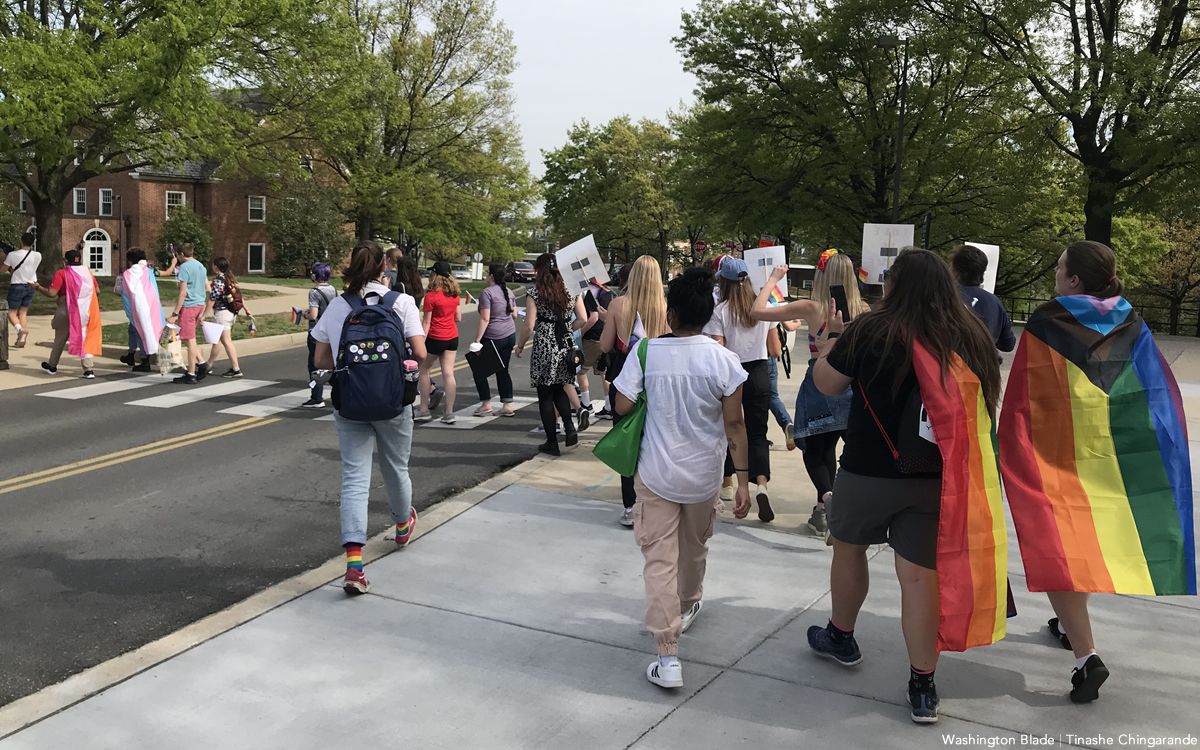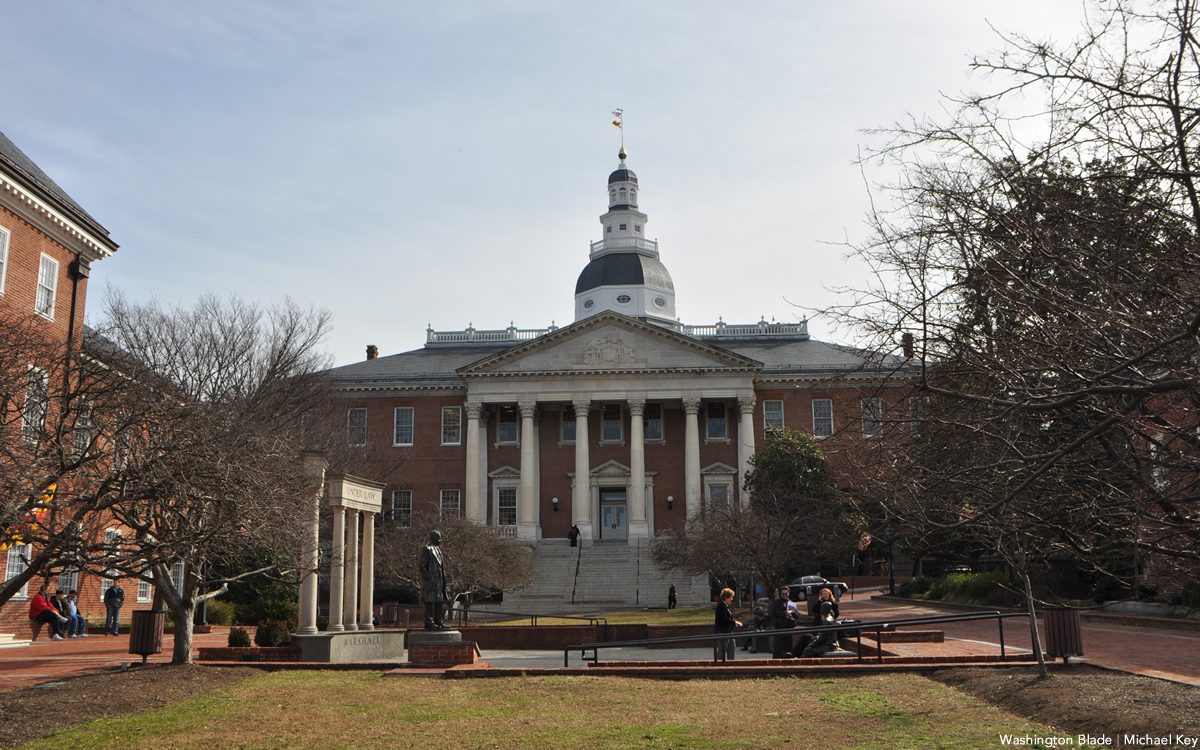Maryland
University of Maryland students march for LGBTQ rights on ‘Maryland Day’
Participants wore Pride flags, waved ‘say gay’ placards

LGBTQ students at the University of Maryland marched across campus Saturday in response to legislation passed in many states that bars the discussion of gender identity and sexual orientation in schools. As this happened, families from across the state were gathered all over campus to celebrate the university’s annual community outreach event, “Maryland Day.”
The “Let’s Say Gay Parade” began in the Adele H. Stamp Student Union, trekked through McKeldin Mall—where many Maryland Day attractions were situated—and ended in the student union. Students, parents and members of the campus community were in attendance.
“For the people who aren’t at this event today, call [and email] your local representatives,” said Veena Aruldhas.
Aruldhas, 23, is a senior studying information science at the university. They are also vice president of the school’s Pride Alliance and also work on the Pride month committee within Multicultural Involvement Community Advocacy, a campus inclusion group.
“Show up for the people who can’t speak for themselves because their rights have been infringed upon,” said Aruldhas.
Legislation aimed at erasing discussions about gender and sexual identity in schools has been on the rise across the country.
Republican Florida Gov. Ron DeSantis signed the controversial “Don’t Say Gay” bill in late March that bans public school teachers from providing instruction about sexual orientation and gender identity in classrooms. The bill also allows parents to sue schools that violate its prescriptions.
Ohio lawmakers also proposed a similar bill in early April that, in addition, limits education about other “divisive concepts” such as the 1619 Project, critical race theory and “any other concept that the state board of education defines as divisive or inherently racist.”
While Maryland legislators this year haven’t launched attacks on classroom instruction like the other two states, recent efforts to provide health equity for transgender individuals through the Trans Health Equity Act were stalled in this year’s General Assembly 90-day legislative session.
Therefore, graduate student Joey Haavik, 26, believes the rise of homophobic legislation around the country escalates the need for Marylanders to review local legislation.
“This didn’t get as much attention,” they said in reference to the Trans Health Equity Act. Haavik is studying international education and policy and works as an advisor to campus LGBTQ organizations. “So, even though people experience many differing levels of hatred, there’s many ways to advocate for our community.”
State Sen. Mary Washington (D-Baltimore City), who attended the event and also gave a keynote speech, spoke on the bill’s failure.
“Events like these empower us to mobilize against attacks on marginalized people in our communities,” she said. “We must be relentless in the fight for a fair and just world.”
House of Delegates candidate Ashanti Martinez also spoke about the bill at the event.
Martinez is a Democrat campaigning for the District 22 seat, and if elected will be the first openly gay Afro-Latino man from Prince George’s County to represent the jurisdiction in the chamber.
“The [bill] vanished … [and] we want to know why,” he said. “This erasure of LGBTQ folks is intentional.”
Maryland
4th Circuit dismisses lawsuit against Montgomery County schools’ pronoun policy
Substitute teacher Kimberly Polk challenged regulation in 2024

A federal appeals court has ruled Montgomery County Public Schools did not violate a substitute teacher’s constitutional rights when it required her to use students’ preferred pronouns in the classroom.
The 4th U.S. Circuit Court of Appeals in a 2-1 decision it released on Jan. 28 ruled against Kimberly Polk.
The policy states that “all students have the right to be referred to by their identified name and/or pronoun.”
“School staff members should address students by the name and pronoun corresponding to the gender identity that is consistently asserted at school,” it reads. “Students are not required to change their permanent student records as described in the next section (e.g., obtain a court-ordered name and/or new birth certificate) as a prerequisite to being addressed by the name and pronoun that corresponds to their identified name. To the extent possible, and consistent with these guidelines, school personnel will make efforts to maintain the confidentiality of the student’s transgender status.”
The Washington Post reported Polk, who became a substitute teacher in Montgomery County in 2021, in November 2022 requested a “religious accommodation, claiming that the policy went against her ‘sincerely held religious beliefs,’ which are ‘based on her understanding of her Christian religion and the Holy Bible.’”
U.S. District Judge Deborah Boardman in January 2025 dismissed Polk’s lawsuit that she filed in federal court in Beltsville. Polk appealed the decision to the 4th Circuit.

By PAMELA WOOD | Dan Cox, a Republican who was resoundingly defeated by Democratic Gov. Wes Moore four years ago, has filed to run for governor again this year.
Cox’s candidacy was posted on the Maryland elections board website Friday; he did not immediately respond to an interview request.
Cox listed Rob Krop as his running mate for lieutenant governor.
The rest of this article can be found on the Baltimore Banner’s website.
Maryland
Expanded PrEP access among FreeState Justice’s 2026 legislative priorities
Maryland General Assembly opened on Jan. 14

FreeState Justice this week spoke with the Washington Blade about their priorities during this year’s legislative session in Annapolis that began on Jan. 14.
Ronnie L. Taylor, the group’s community director, on Wednesday said the organization continues to fight against discrimination against people with HIV/AIDS. FreeState Justice is specifically championing a bill in the General Assembly that would expand access to PrEP in Maryland.
Taylor said FreeState Justice is working with state Del. Ashanti Martinez (D-Prince George’s County) and state Sen. Clarence Lam (D-Arundel and Howard Counties) on a bill that would expand the “scope of practice for pharmacists in Maryland to distribute PrEP.” The measure does not have a title or a number, but FreeState Justice expects it will have both in the coming weeks.
FreeState Justice has long been involved in the fight to end the criminalization of HIV in the state.
Governor Wes Moore last year signed House Bill 39, which decriminalized HIV in Maryland.
The bill — the Carlton R. Smith Jr. HIV Modernization Act — is named after Carlton Smith, a long-time LGBTQ activist known as the “mayor” of Baltimore’s Mount Vernon neighborhood who died in 2024. FreeState Justice said Marylanders prosecuted under Maryland Health-General Code § 18-601.1 have already seen their convictions expunged.
Taylor said FreeState Justice will continue to “oppose anti anti-LGBTQ legislation” in the General Assembly. Their website later this week will publish a bill tracker.
The General Assembly’s legislative session is expected to end on April 13.




















